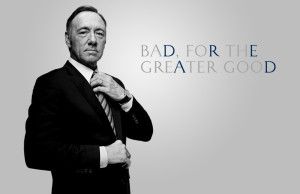
Posted March 11, 2015
THE BASICSI always like to take the opportunity to explain misunderstood psychiatric concepts or diagnoses, and to clarify when a psychiatric term is used incorrectly or prone to misinterpretation. In today’s blog, I aim to do both of these things.
First, I’ll use the character of Frank Underwood as a “case study” to illustrate the misunderstood psychiatric diagnosis of Antisocial Personality Disorder (ASPD). Those with ASPD can inflict significant psychological, emotional, and/or physical trauma on others.

While enjoying the second season of House of Cards, I could not help but notice how Kevin Spacey’s character, Frank Underwood, meets a textbook definition of Antisocial Personality Disorder (ASPD). Inspired by Spacey’s tremendous performance, I thought I would venture forth and use this example of a central character in a drama to illustrate this misunderstood and, often, underestimated psychiatric disorder.
Individuals with antisocial personality disorder (or sociopaths) are difficult and dangerous; they deny, lie, and contribute to all manner of mayhem in our communities and societies. They know full well what is going on around them and know the difference between right and wrong (and hence are fully responsible for their own behaviors) yet are simply unconcerned about such moral dilemmas.
Below is the “textbook” definition of ASPD interspersed with examples from the life of Frank Underwood, which perfectly illustrate the elements of this disorder.
SPOILER ALERT: For those of you who have not watched all of Season 2 yet, consider yourself warned.
Antisocial Personality Disorder 301.7 (From the DSM V):
A) A pervasive pattern of disregard for and violation of the rights of others, occurring since age 15 years, as indicated by three (or more) of the following
1) Failure to conform to social norms with respect to lawful behaviors, as indicated by repeatedly performing acts that are grounds for arrest.
Murder. Not once, but at least two times (that we know of). He swiftly pushed Zoe Barnes into the path of an oncoming metro train. Let’s not forget this was a woman with whom he had had a physical relationship with and a (sort of) emotional intimacy. No doubt, this personal history contributed to Barnes’ poor judgment and her letting down her guard; she suspected he was a murderer but still underestimated what he was truly capable of. Frank leveraged her miscalculation to his favor.
In addition to murder, let’s not forget the unlawful behaviors carried out, on his orders, by those who work for him—e.g. vanquishing the remaining reporters who tried to expose him for what he truly is.
2) Deceitfulness, as indicated by repeated lying, use of aliases, or conning others for personal profit or pleasure

Honestly, I found it hard to keep track of the web of lies Frank wove during Season 2. What was notable was the sincerity with which he told many of these lies, almost as though in the moment he believed them himself. He repeatedly lied so he could drive a wedge in the previously tight relationship between the Billionaire, Raymond Tusk, and the President—a wedge he created, on purpose (and at much cost and hassle to the American tax payer!) to further his own goal of becoming President.
THE BASICSThen there was the web of lies told to cover the fact that his wife Claire’s (played by Robin Wright) abortion had nothing to do with her alleged rape by General McGinnis, but more to do with the inconvenience of Underwood’s political campaign timings.
A final example is the strategic drama he created (along with Claire) to cover her affair with Galloway. Again, there was no inkling of any remorse or feelings that they should be held accountable for their actions. Instead there was only a rigid entitlement: How dare anyone get in the way of me becoming president?
3) Impulsivity or failure to plan ahead
Underwood has a degree of impulse control. In fact, his ability to plot, scheme, and plan has served him well with regards to his political posturing and career. This is not the case for many with ASPD. Those without means, education, or status can be dangerously impulsive, and this behavior often leaves them in jail, prison, or dead.
Personality Essential Reads4) Irritability and aggressiveness, as indicated by repeated physical fights or assaults
See point #3. He is aggressive and violent but has probably learned, over time, to become more measured in his actions. Repeated irritable outbursts and acts of physical aggression are not compatible with life in political office.
5) Reckless disregard for safety of self or others
6) Consistent irresponsibility, as indicated by repeated failure to sustain consistent work behavior or honor financial obligations
Did Frank Underwood honor any of his obligations or duties associated with being the Vice President of the United States of America? Did he use his powers to be of service to the American people or to his country? No. His days and nights appeared to be utterly consumed with one goal…to become president of the United States. At any cost.
7) Lack of remorse, as indicated by being indifferent to or rationalizing having hurt, mistreated or stolen from another.
This was best illustrated in his reaction to the murder of Zoe Barnes. It was business as usual. Not a hair out of place, no loss of appetite or sleep. No remorse, no guilt or angst. She was getting in his way as he tried to forge a path to the presidency, so he got rid of her and never thought about it again. Her murder was no more of an incident than flicking lint from his jacket lapel. In fact, he was so cool after the event that it makes me wonder about his psychopathic tendencies, but that would be a whole other blog for another day.
B) Individual is at least 18 years old
C) There is evidence of conduct disorder with onset before age 15 years
Who knows what skeletons lie in the Frank Underwood closet?
D) The occurrence of antisocial behavior is not exclusively during the course of schizophrenia or bipolar disorder.
One final point that is not done justice in the brief description above (more details can be found here)—those with ASPD are able to be utterly charismatic, charming, and almost bewitching. This characteristic is one Spacey has down to a tee in his performance.

When Frank wants something or needs to manipulate someone, he is able to “switch on” the charm in an instant. He conveys to others that he cares deeply about them by flashing an infectious smile and being gracious and attentive.
And, as season 2 showed, there were many who fell prey to his deceit…not least of all the President of the free world. Perhaps nowhere is his charisma more evident that in the perverse loyalty of those in his inner circle; all turn a blind eye to what he is capable of and appear to be utterly captivated by his personality and presence.
My second point: The term “antisocial” is used incorrectly or prone to misinterpretation.
The seriousness of ASPD leads me to my next point—the confusing usage of the term “antisocial.” Antisocial is often used in lay language to indicate someone who is shy and unwilling or unable to associate in a normal or friendly way with other people. While this is a legitimate definition of the word, I have never been a fan of how this one word can be used in such opposing ways. I would advocate that we reserve this word for individuals with personality disorders associated with the features described above. People who are described as “antisocial” because they are shy are (typically) not dangerous. This is in sharp contrast to the definition of antisocial widely used in mental health terminology. In this context antisocial goes hand in hand with being “antisociety” and is a disorder associated with much more sinister and outright dangerous and reckless behavior.
At this point, many of you might be saying, well who cares about these individuals? They are just evil, so why bother to make a psychiatric case about them? Just lock them up and throw away the key!
But the situation is vastly more complicated than that.
ASPD is common. For the reasons outlined above (their lies, deception, and charm) sociopaths are not always easy to detect, yet ASPD is associated with huge costs to our society that extend well beyond the individual who has the disorder. We have to stay curious about ASPD—about how the disorder develops, how to detect it, how to manage it—as our societies pay for its consequences on many levels, economically, socially, and emotionally.
And when someone with ASPD ends up in a position of unparalleled power? Well, who knows what trauma (psychological and physical) they will inflict on those around them?